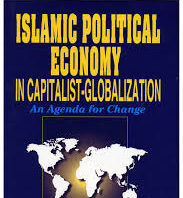International Workshop on “Islamic Political Economy and Capitalist Globalization, an Agenda for Change”

Section I
Current Global Situation
1. End of cold war and drift towards a unipolar world.
2. The fall of Communism and the alleged vindication of “Political and Economic Liberalism” as the ideology of the times.
3. The failure of development strategies and consequenit impoverishment of he Third World and its increasing dependence on he West.
4. The Clash of Civilizations syndrome and projection of Islam as a threat.
5. The marginalization of the world of Islam.
Section II
The Real Predicament of the Muslim Ummah
1. Rich in resources -human and material-poor in leadership and resource-utilization.
2. Colonial socio-political institutions and structures: failure to move to a post-colonial era. Bothin ‘secular’ as well as ‘religious’ realms.
3. Economic and technological gap.
4. Imitative approaches and strategies; Crisis of identity and confusion about goals.
5. Moral crisis-dichotomy between Religion and Society; faith and politics.
Section III
The Islamic Response
1. Distinction between Islam and the present day Muslim society and state.
2 Status quo-Muslim but not Islamic!
Islam-as an ideal-source-roots-destiny
Islam as a critique of
Present day Muslim society and Muslim history
The challenge from the West.
2. Rediscovery of Islamic roots, identity and idealism
Futuristic approach
Ijtihadi approach
Integrative approach
3. Integration of moral and spiritual with the material and physical Islamization means transformation of all realms of life and existence-arrall-embrassing and integrative approach.
i) Re-awakening of faith, purification and consolidation of moral and ethical aspects.
ii) Intellectual challenge and response education/information.
Change of society and institutions.
iv) Political will/power.
[Shah Waliullah: Recepie for Revival: Ijtihad + Jehad]4. Starting point present day Muslim states concern for co-existence, cooperation, common goals and strategies, collective self-reliance without opting for isolationism or autarky Relationship with the West, with the Rest.
5. Gradual and Evolutionary approach, systematic work to achieve revolutionary results: peoples’ involvement, participation, and people to be the beneficiaries of growth and development.
Section IV
Critical Minimum-A (Approach and Goals)
1. Moral and ideological commitment-
No Islamization without ‘Islam’
Idealism/Motivation.
2. Independences/Self-Reliance/Minimization of dependence/Security.
3. Strength/Development/Power.
4. Justice, Equity and Caring.
5. Homogeneity/Integration within
6. Technology/Efficiency
7. Free and Responsible society Rights and Duties Incentives and Sanctions Freedom and Responsibility.
8. Family, Civil society and State: Harmonious Relaionships.
9. Private Property and Enterprise, Market-mechanism with moral filter, and state supervision and judicious intervention.
Section V
Critical Minimum – B (Strategies and Priorities)
1. Moral awakening, revival of faith, development and dissemination of information and education. :
2. Man-centred development strategy development of human resources and human environment.
3. Agricultural/Industrial/Tertiary (Service) development from an indigenous base.
Production and consumption of useful goods and services:
Halal and Haram dimension
Priorities in the light of Maqasid-e-Shariah
Avoidance of waste and frivolities
5. Distributive justice
6. Regional/Sectional balance – Decentralized growth.
7. Improvement in the Quality of life.
Education and skill generation
Employment creation
System of social security and solidarity.
8. New technology, research and development.
9. Reduction of national dependency on the outside world and greater integration within the Muslim World:
Food
Defence
Technology
Section VI
Uniqueness of the Islamic Approach
How different from
Western Liberalism
Socialism
Green Socio-Economics.
INTERNATIONAL WORKSHOP ON “ISLAMIC POLITICL ECONOMY AND CAPITALIST GLOBALIZATION; AN AGENDA FOR CHANGE”
UNIVERSITI SAINS MALAYSIA, PULAU PINANG, MALAYSIA
(DECEMBER 12-14,1994)
KEYNOTE ADDRESS by
Senator Prof Khurshid Ahmad Chairman, Institute of Policy Studies Islamabad. Pakistan.





